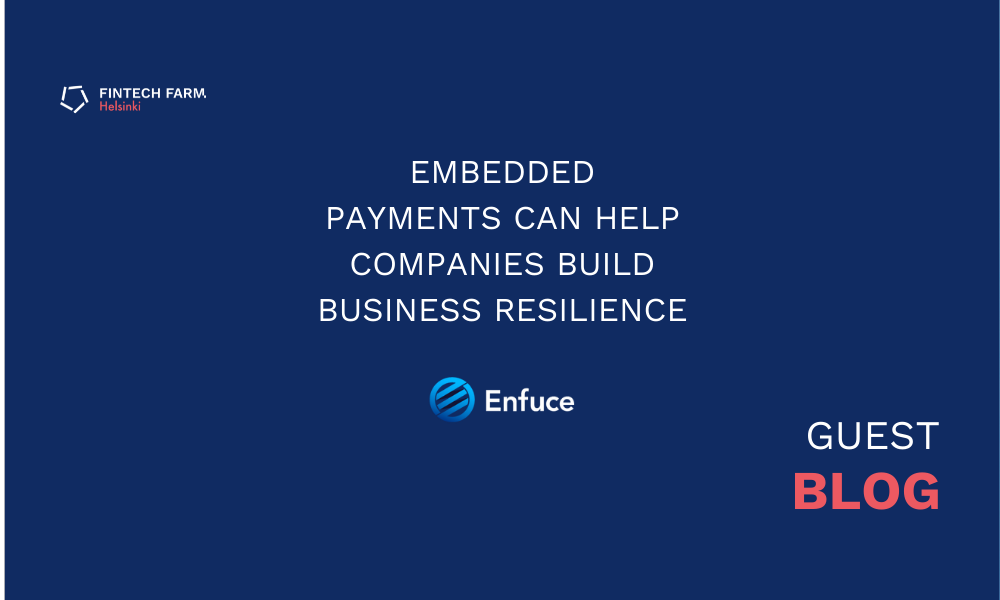Embedding payments into a core service flow is a way for a large variety of companies to future-proof their business and build resilience in uncertain times. To get started, many companies launch their own branded payment service – a stepping stone to owning a bigger chunk of the customer experience and to gaining all the benefits that come with it.
McKinsey is expecting the embedded finance market to double in size in the next 3 to 5 years. That alone tells us that this is a market that is standing strong against the tidal wave of the downturn and the uncertainties of the future.
So how can any company offering a digital service future-proof their business with payments? In this blog, I share some examples of the ways embedded payments help companies build business resilience while navigating the rapidly changing industry landscape.
1. Secure future revenue streams in a volatile economy
Grab revenue streams from third parties
By owning the payments part of their customer journey, companies can tap into revenue streams that previously went to third parties.
Many digital service providers are expanding in their value chain and becoming payment players themselves. One success story of a company generating revenue from payments is Shopify. They are an online shop provider, yet over 70% of their revenue comes from merchant payments – payment processing fees, transaction fees, referral fees, and advertising revenue, to name a few.
Both B2C and B2B digital service companies can open a new revenue stream by embedding payments and finance into their service flows. Embedded credit is a good example of a service that both adds economic flexibility for the customer and earns revenue for the company.
Harness payment data for service development
With embedded payments, companies can own their payments data. This data is something that cannot be retrieved from any other source. It gives companies access to real-time information about the consumption patterns, preferences, and behaviours of their customers. Payment transaction data also gives companies visibility into the purchases made at partners and other merchants.
Companies can then use this valuable source of insights to develop even better service flows and loyalty programmes for customer stickiness and new services and products for added revenue.
Monetise your brand with new customer touchpoints
Adding customer touchpoints through an embedded payment experience can be a real brand and loyalty booster. Many original equipment manufacturers (OEMs), like car and device manufacturers, have found ways to monetise their brand by providing an extended customer experience with payments and financing.
Car manufacturers have some of the most brand loyal customers in the business world. In addition to paying for a car, the users also pay for its usage in numerous contact points weekly, be it filling the tank or charging, car wash, parking, or something else.
Manufacturers can extend the brand experience to payments and cover a much wider range of contact points, building their brand and customer loyalty along the way.
2. Save costs on payments and help your customers and partners do the same
Help customers with smart finances and mitigate risks for your business
Given the inflation, increasing interest rates, and decreasing liquidity of households and businesses, companies are in a key position to help their customers with advice related to sustainable financial choices, saving, and investment strategies.
When embedding payments into their services, companies can build in processes, products, and advice that help customers consume sensibly and within their means. This increases stickiness and also lessens the risks for the company.
Launch closed loop cards for cost savings and merchant support
We all know that the economic crisis calls for better finance management and cutting costs, both in consumer and B2B contexts. Here embedded finance, and especially features like closed loop payments, can help.
In merchant settlement, closed loop payments are ideal for merchants dealing with big volumes to pay their subcontractors. Virtual closed loop cards can be issued instantly and enable marketplaces to pay their SME merchants, reducing the fees charged by payment service providers and payment rails.
By launching merchant settlement cards, marketplaces would help small businesses and entrepreneurs keep their costs reasonable and stay on the ecommerce platforms, bringing a positive effect across the value chain.
Prepare for the unknown by rethinking your services
Challenges in the payments supply chain, such as chip shortage for physical cards, cause unexpected hurdles for companies offering financial services.
Established companies can build their business resilience by rethinking how they design and deliver their services. Concrete choices can include the adoption of virtual cards and increased flexibility of payment devices through tokenisation, for instance.
Often, the choices that build resilience are also the ones that many customer groups expect from modern, digital financial services. So companies are building and engaging their future loyalty customers at the same time.
3. Partner up with companies who can help future-proof your business with payments
Get started fast without a big upfront investment
To innovate during financially uncertain times, companies need to be able to test new concepts and services in low-risk ways. With the right partner, companies can build embedded payment solutions without the need for large upfront investments. Cloud-based platforms scale easily and bring flexibility, which helps to ensure the relevance of a payment solution also in the future.
Also a clear and cost-predictable pricing model helps companies plan their business and succeed in their endeavours, even in unpredictable times.
Enter the credit business with a balance sheet partner
More and more companies are making money with money. Becoming a credit provider will offer new revenue, but the traditional way of entering the credit business takes funds and poses risks.
Balance sheet partners can provide risk and compliance services as well as the tech needed with low investment.
Outsource compliance to an expert
Regulations are there to help make the payment business safe and secure for companies and their customers. For most companies looking to embed payments into their services, payments are not their core business nor do they have related expertise in-house.
Partnering up with a payment company means that companies can focus on their own business and customer experience without having to worry about keeping up with tightening regulations. The partner will take care of the compliance of the solution, processing, and data handling.
Get to know Enfuce platform – the hassle-free way to launch payment cards.
Hear more from Enfuce at the Digital Finance Forum
Author
 Venla Pouru is the Director of Strategy and Growth at Enfuce. Enfuce is one of Europe’s leading payment processors, on a mission to enable fintechs, banks and digital service companies to create next-level payment experiences. Venla is driving the company’s global expansion through opening new geographical markets and industry segments. Prior to joining Enfuce, Venla has worked 10 years in new business building and top management consulting.
Venla Pouru is the Director of Strategy and Growth at Enfuce. Enfuce is one of Europe’s leading payment processors, on a mission to enable fintechs, banks and digital service companies to create next-level payment experiences. Venla is driving the company’s global expansion through opening new geographical markets and industry segments. Prior to joining Enfuce, Venla has worked 10 years in new business building and top management consulting.



